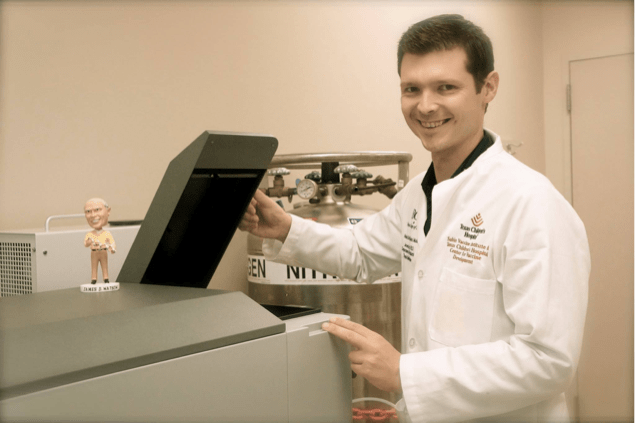Do you enjoy your job?
Pollet: “I am a strong believer in our mission to develop vaccines for the poorest people living in the tropics, having seen the problems in Africa. Our hypothesis is that the neglected tropical diseases (hookworm, Chagas, dengue, schistosomiasis and leishmaniasis) are an important cause of poverty because of their adverse effects on child growth and development and worker productivity. Preventing and eliminating these diseases will have a positive impact on the health and the economics of the society. Unfortunately, there is no big pharma interested in developing these vaccines, as no profits are to be expected. I am happy to be a part of a group that tries to make a difference. The job is all about teamwork and collaboration between teams. Every vaccine needs formulation, so I have a part in each and every project. There is no shortage of challenges.”
How do you like Houston?
Pollet: “Everything is bigger in Texas, and Houston does not disappoint. It’s a booming American city dominated by three sectors: the oil industry, logistics and the medical center. Although it’s not a typical tourist destination, visitors are usually pleasantly surprised. We are known nationwide for great restaurants, museums and diverse cultural events. Because of the many expats and the big influx of Latinos, Houston surpassed New York and Los Angeles as the most ethnically diverse metropolitan area in the US. Being born and raised in a different continent is just what makes me fit in.
“I can`t choose what is best when comparing living in Texas to living in Belgium because the differences are too many. I like the friendly southern people, the nice warm weather and the never-closing supermarket, but I miss the honest and realistic Belgians, the seasons and the local bakery.”

At the San Jacinto monument in 2016, as the team captain of an international running team that completed a 200-mile relay race in under 28 hours.
What is the difference between working there and working in Belgium?
Pollet: “People in the US work longer and takes fewer days off. The commitment to the job is also bigger in my opinion. People are more proud of what they do and accomplish (not only professionally). For me personally, I am convinced that — at this point of my career — my degree, cultural background and experience is of greater value here. We have a different way of solving problems and designing experiments compared to American and Latin American scientists, and my input is often much appreciated.”
Do you miss your friends and family in Belgium? Are you still in touch with them after so many years?
Pollet: “My wife and my son are here, and that makes a big difference — I am not alone. Living far away from the rest of the family has been a mixed experience. We do miss them very much, and we wish that Houston wasn`t that far away. On the other hand, the relations with some family members have been improving, because we only have quality-time visits. Meanwhile, we have a large group of friends who we look upon as our Houston family.”
What do you miss most about Belgium?
Pollet: “I dislike the fact that I can`t bicycle to work and that a parking spot at my office costs $200+ per month. Efforts are being made, but it takes time to build bike lanes and change people’s attitude toward bicyclists.”
How do you spend your time when you’re not at work?
Pollet: “I spend a lot of time with my one-year-old son, Arno, visiting the zoo, playgrounds, waterparks, museums and the beach. To escape everyday life, I like to go running, cycling, rock climbing and scuba diving. The first three are to keep me fit; scuba diving is my real passion. Houston is located near the Gulf of Mexico. You can take a boat in Freeport to visit the Flower Garden Banks National Marine Sanctuary , a pristine coral reef about 100 miles from the coast. The reef teems with marine life such as manta rays, hammerhead sharks, whale sharks and hundreds of species of fish and coral.”
If possible, would you like to do the same job living in Belgium? Do you hope to return permanently to Belgium at some point?
Pollet: “I do not exclude the possibility of a return to Belgium. There are excellent tropical institutes in Belgium. However, because of its geographical location and its sub-tropical climate, Houston itself is vulnerable for tropical diseases such as the West Nile virus, Chagas, Zika etc. My research group plays an active role in monitoring these diseases in Texas. This makes what we do very important for the local people, and I like that connection.”

What dreams and future ambitions do you still have?
Pollet: “I have a 1-year-old son and a second baby on the way. Raising kids far away from family is challenging. Therefore, my personal ambitions have changed a bit in the last two years. Life is still good and exciting, but my family is definitely the most important now.”
Pollet obtained a PhD in Bioengineering at the KU Leuven in 2010. Prior to joining BCM and the Sabin Vaccine Institute, he worked as a Fulbright postdoctoral researcher on molecular diagnostics of tropical diseases at the University of Houston


